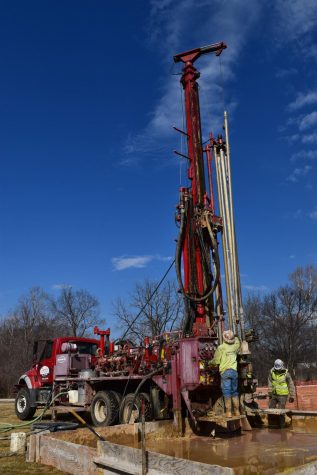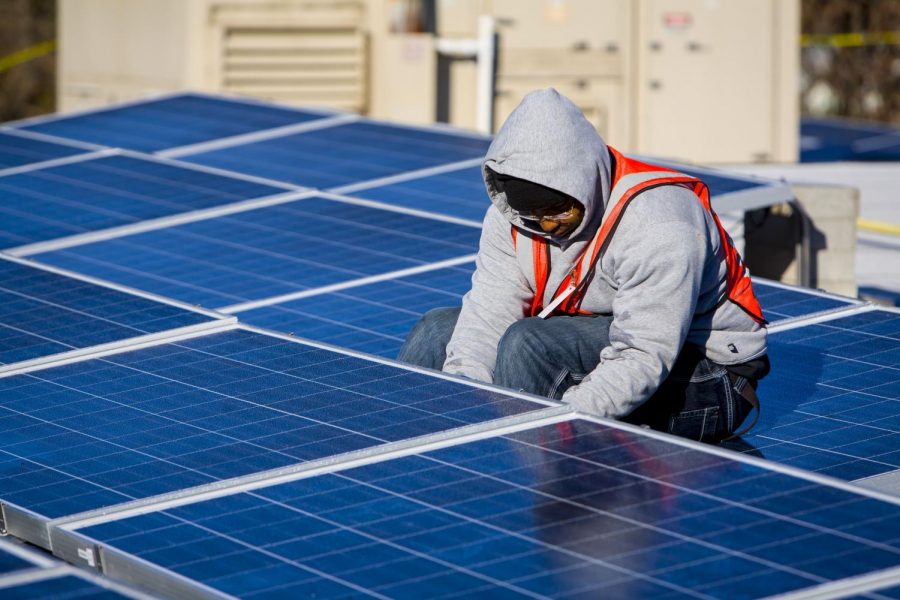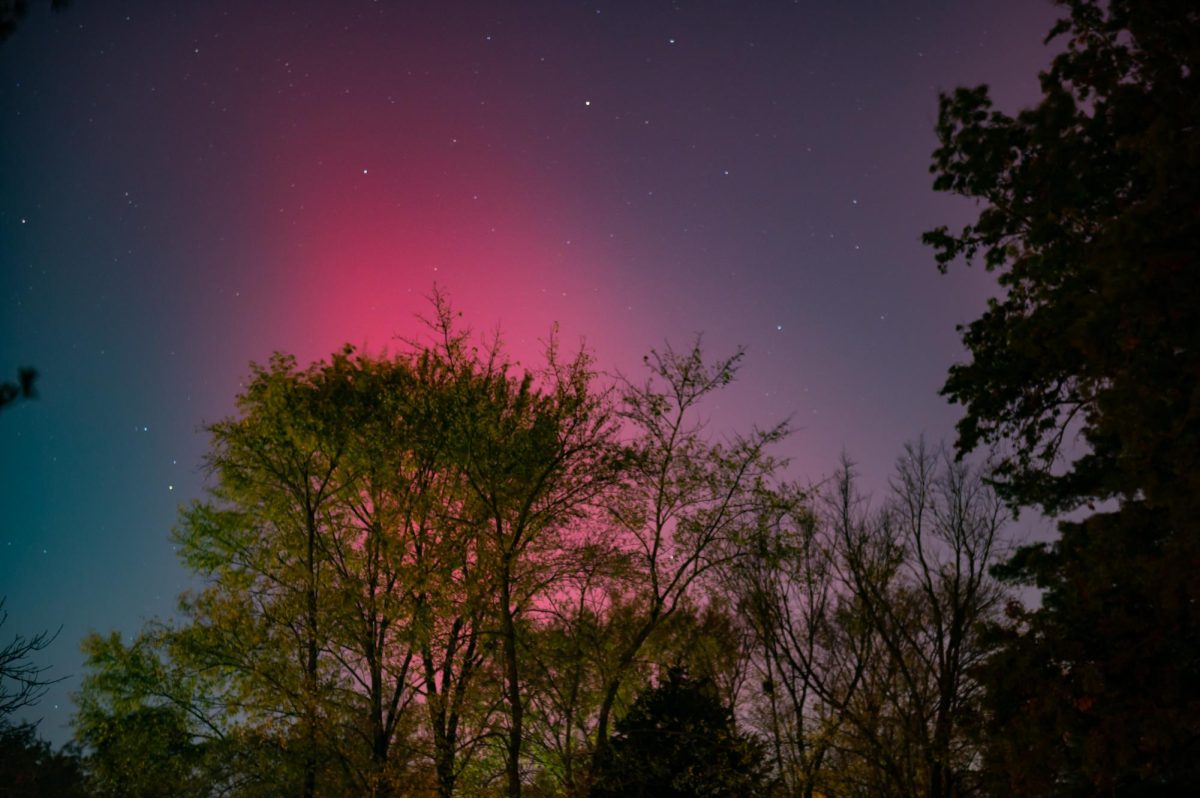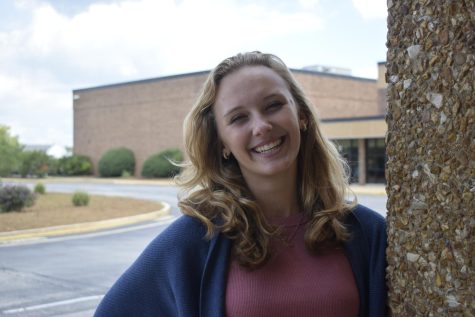The National Public Radio reported earlier this month that the Australian bushfires were fully extinguished. Fueled by prolonged drought and enduring for over 240 days, the bushfires burned through more than 27 million acres of land, claimed the lives of at least 30 people and destroyed about 3,000 homes.
“It was just so crazy to think that a whole continent was just burning, and there was nothing we could do about it. It was just really really tragic, with the amount of wildlife that was being lost and the amount of damage that was being done,” leader of an environmental awareness club called the Thirst Project and junior Salma Ahmed said.
Parkway Director of Sustainability and Purchasing Erik Leuders speculates this all comes back to climate change.
“I mean the climate crisis is real. It is very apparent. The science is there. Our time is running out. And so we need to move at breakneck speeds to make a difference and start making a positive impact,” Lueders said.

Construction workers build a pilot geothermal well field by testing the thermal conductivity of the soil. Parkway South High School installed a geothermal well field that uses the Earth’s constant temperature to heat and cool buildings, last summer. “[Installing the field is] pretty innovative for this region, even though it’s been tried in other parts of the country, so we’re excited about seeing the implications of that things are working out,” Lueders said.
Lueders believes there is more everyone can do on a daily and personal basis that can change the world and have positive effects on the environment.
“There are a lot of things we can do, and it’s imperative that all of us take small steps, hopefully with an accelerating pace, to make a difference,” Lueders said, “There are a million and one things that we can all do, and it can seem overwhelming, it can absolutely seem overwhelming, but we all need to start somewhere. And if it’s even just making a pledge that I’m going to try to find one new thing to do every two weeks, then let’s do that,”
With the mindset that there’s always something to be done, Parkway has already begun taking steps to be more environmentally friendly.
“We’re saving over a million dollars a year in spending, but the associated carbon emissions are what really excites me. I’ve seen how much fewer CO2 emissions are going into the atmosphere because of all this work that we’re doing,” Lueders said.
The district has been working on a number of projects starting with reducing cafeteria waste and implementing LED light bulbs.
“We’re saving about 500 tons of food waste that’s being diverted from a landfill to a compost facility,” Lueders said.“Plus we’re rolling out with LED conversion, so Parkway West High is one of many schools that is about complete with converting all lighting from fluorescent over to LED,” Lueders said.
In addition to introducing LEDs and compost facilities, Parkway is implementing vacancy sensors and maintaining native landscaping.
“We’re starting to use vacancy sensors in buildings, so automatically turning off lights when no one’s in the space,” Lueders said. “Currently, we are working on getting a better handle on maintaining native landscaping. We’re trying to convert areas from turf, which is a very shallow-rooted grass that doesn’t provide any biodiversity or ecological benefits to the space they’re in, to native plants. Parkway is fortunate because we have a lot of green space that we could potentially convert over to Missouri native plants, wildflowers, and pollinating plants that can support biodiversity such as monarch butterflies and other species.”
Parkway will also expand solar panel usage and geothermal well fields as well.

Solar panels and geothermal well fields are assisting in Parkway’s goal of becoming more sustainable.
“Over the summer we installed an expansion to the solar arrays at four different schools, one of which [was] Parkway West High, so it was a 25-kilowatt array and now is a 100-kilowatt array, meaning the district is now generating over 1.1 megawatts of solar capacity. At Parkway South High School, we installed a geothermal well field, and that was a really big project. So now we’re essentially using the Earth’s constant temperature as a mechanism to provide heating and cooling to the interior spaces, which is something that Parkway’s never done, and many institutions within the St. Louis area just haven’t done,” Lueders said.
West has an Environmental Club, and although they are currently on hiatus, they have plans to continue to support the environment. Thirst Project, led by junior Salma Ahmed, also works to promote environmental and humanitarian concerns.
“Our main goal is just raising money to build a well for people that don’t have fresh and clean water. Our goal is [to raise] awareness about the water crisis in our school meet every other Thursday in Mrs. Van Matre-Woodward’s room at 7:30 in the morning, and we talk about fundraising ideas that we’re planning to do around the school,” Ahmed said.
Despite current efforts, Lueders says more remains to be done.
“There’s always an opportunity to do more, and I feel like the work is never done until we’re net-zero energy, net-zero water, and zero landfills, which are some ambitious goals, but I think we’re on the right path and we just need to keep our resolve and keep the momentum going,” Lueders said.



![Gazing up from the stage, junior Joseph McCurdy who played Peter Pan in the school play, Lost Girl, sits next to senior Juliana Rogers, who plays Wendy Darling, during a theater rehearsal. McCurdy’s passion for theater began when he observed a West High production in middle school. “I've been in the high school theater program since I was a freshman. I've always loved theater, but [what prompted me to join] was [when] I went to see [a performance here] when I was in middle school, and it was super cool,” McCurdy said.](https://pwestpathfinder.com/wp-content/uploads/2025/11/IMG_6535-1200x798.jpeg)

![Standing tall, stacked in a precise formation, the cheer team strikes a signature pose during halftime on Sept. 12 at the varsity football game. Nearly a month after this performance, the cheer team performed at the Missouri Cheerleading Coaches Association (MCCA) regional competition on Oct. 4, 2025. “We've all come [to] work together a lot more,” sophomore Elyssa Philippi said. “We're a lot closer than we were [earlier in the season] and going to state has made us closer [in] trying to work with each other, learn [new] skills and make our team better.”](https://pwestpathfinder.com/wp-content/uploads/2025/11/DSC5139-1.jpg)
![Handing out candy to excited trunk-or-treaters, President of the United Nations Children’s Fund club and junior Sara Ashok represents that group. Ashok was eager to participate in this event for multiple reasons. “I really wanted to be a part of the event because I get to help create memories for kids and spend time with my friends, spreading the things [I'm passionate about],” Ashok said.](https://pwestpathfinder.com/wp-content/uploads/2025/11/DSC_8648-1-1200x800.jpg)

![Smiling in a sea of Longhorns, Fox 2 reporter Ty Hawkins joins junior Darren Young during the morning Oct. 3 pep rally. The last time West was featured in this segment was 2011. “[I hope people see this and think] if you come to [Parkway] West, you will have the time of your life because there are so many fun activities to do that make it feel like you belong here. I was surprised so many people attended, but it was a lot of fun,” Young said.](https://pwestpathfinder.com/wp-content/uploads/2025/10/Edited2-1200x798.jpg)
![West High seniors and families listen as a representative of The Scholarship Foundation of St. Louis, Teresa Steinkamp, leads a Free Application for Federal Student Aid (FAFSA) workshop. This session, held in the library, provided guidance on financial aid, scholarships and student loan options. “This event is very beneficial for any seniors who are applying to or considering applying to colleges after high school [because] the cost of college is on the rise for seniors and parents,” college and career counselor Chris Lorenz said.](https://pwestpathfinder.com/wp-content/uploads/2025/09/DSC_4478-1200x778.jpg)
![Senior Kamori Berry walks across the field during halftime at the Homecoming football game on Sept. 12. During the pep assembly earlier that day, she was pronounced Homecoming Queen. “I thought it was nice that the crowd [started] cheering right away. I know [my friends] were really excited for me, and my family was happy because typically non-white people don't win,” Berry said.](https://pwestpathfinder.com/wp-content/uploads/2025/09/DSC7046-Enhanced-NR-1200x798.jpg)



James R Ramig • Mar 26, 2020 at 8:05 pm
Amazing article. Thank you to the writer!
Debra Klevens • Mar 26, 2020 at 9:10 pm
Thank you for your feedback. Our journalists certainly enjoy receiving feedback from the community.